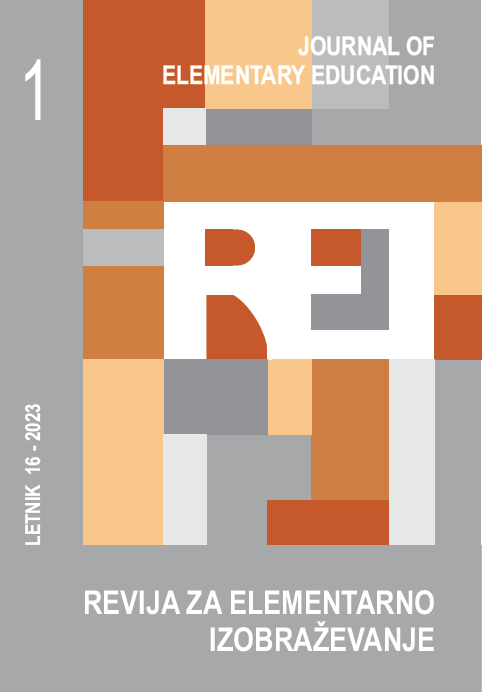Parent-Teacher Conference as a Rhetorical Challenge in Educational Practice
DOI:
https://doi.org/10.18690/rei.16.1.2685Keywords:
educator’s communication skills, parent-teacher conference, rhetorical skillsAbstract
This paper analyses educator’s communication skills during parent-teacher conferences in kindergarten. We researched the way educators communicate during twelve parent-teacher conferences in various kindergartens. In accordance with the methodology of qualitative research, chosen elements of educator’s communication during the parent-teacher conferences were observed and recorded. Results showed that observed parent-teacher conferences are well-prepared, structured, substantially suitable and interactive, with apt vocabulary and elements of eloquence. The greatest shortcoming of the educator’s communication was an underdeveloped active listening technique. Moreover, there were obvious differences in individual communication skills of the educators. The results of this research can serve as a tool for contemplating pedagogical practice in early childhood education.
Downloads
References
Caspe, M. S. (2003). How Teachers Come to Understand Families. The School Community Journal, 13(1), 115–131.
Daly, J. A., and Vangelisti, A. L. (2003). Skillfully instructing learners: how communicators effectively convey messages. In: Green, J. O., Burleson, B. R. (eds.), Handbook of Communication and Social Interaction Skills, pp. 871–908. New Jersey: Lawrence Erlbaum Associates.
Gnjato, V. (2003). Sastanci – interesno komuniciranje. Zagreb: Alinea.
Graham-Clay, S. (2005). Communicating with Parents: Strategies for Teachers. The School Community Journal, 15(1), 117–129.
Hargie, O. D. W. (2004). Communication as skilled performance. In: Hargie, O. D. W. (ed.), The Handbook of Communication Skills – second edition, pp. 7–28. New York: Routledge.
Irvin, J. L., Meltzer, J., Mickler, M. J., Phillips, M. and Dean, N. (2009). Meeting the Challenge of Adolescent Literacy: Practical Ideas for Literacy Leaders. USA: International Reading Association.
Juul, J. (2002). Razgovori s obiteljima: perspektive i procesi. Zagreb: Alinea.
Lemmer, E. M. (2012). Who’s Doing the Talking? Teacher and Parent Experiences of Parent-Teacher Conferences. South African Journal of Education, 32, 83–96.
Lepičnik Vodopivec, J. (2010). Sodelovanje staršev z vrtcem kot dejavnik kakovosti vrtca. Revija za elementarno izobraževanje / The Journal of Elementary Education, 3(2–3), 63–78.
Milanović, M. et al. (2014). Pomozimo im rasti: priručnik za partnerstvo odgojitelja i roditelja. Zagreb: Golden marketing – Tehnička knjiga.
Minke, K. M., and Anderson, K. J. (2003). Restructuring routine parent-teacher conferences. The Elementary School Journal, 104, 49–69.
Modrej, M., and Cugmas, Z. (2015). Poklicni stres in profesionalni razvoj učiteljev razrednega pouka. Revija za elementarno izobraževanje/The Journal of Elementary Education, 8(4), 29–47.
Ozmen, F., Akuzum, C., Zincirli, M., and Selcuk, G. (2016). The communication barriers between teachers and parents in primary schools. Eurasian Journal of Educational Research, 66, 26–46.
Petek, T. (2013). Kritični prerez besedilnih vrst v povezavi z učiteljevim oz. vzgojiteljevim govornim nastopanjem. Revija za elementarno izobraževanje / The Journal of Elementary Education, 6(4), 21–36.
Petek, T. (2014). The Teacher as a Public Speaker in the Classroom, Studies in Literature and Language, 9(1), 124–133.
Plazar, S. (2010). Uporaba računalnika med uzgojitelji i učitelji prvega triletja pri obravnavi družboslovnih vsebin. Revija za elementarno izobraževanje / The Journal of Elementary Education, 3(2-3), 33–46.
Rađenović, A., and Smiljanić, M. (2007). Priručnik za razrednike. Zagreb: Alinea.
Reardon, K. K. (1998). Interpersonal Communication: Where Minds Meet. Belmont, CA: Wadsworth Publishing Company.
Stevens, B. A. & Tollafield, A. (2003). Creating comfortable and productive parent/teacher conferences. Phi Delta Kappan, 84(7), 521–524.
Škarić, I. (2000). Temeljci suvremenoga govorništva. Zagreb: Školska knjiga. Allport, G. W. (1958). The nature of prejudice. Oxford: Addison-Wesley.
Downloads
Published
Issue
Section
License
Copyright (c) 2023 Jelena Vignjević, Marina Pavlović Pintarić

This work is licensed under a Creative Commons Attribution 4.0 International License.
